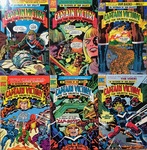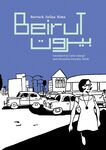
Ben Katchor's latest, and, at 496 pages, longest work to date is a history of mankind as viewed through the prism of going out and gettting something to eat – and a significant departure from his previous works, primarily in that it is not, at first glance, comics as we know them, but rather a hybrid of text and image. Gradually, it becomes clear that this is, nonetheless, a form of comics, and this is part of the work's formal thesis. Every spread contains one or more illustrations, rendered in Katchor's trademarked pen & ink w/inkwash. A clean, modern sans serif text then wraps around these illustrations, which literally run seamlessly from cover to cover, making The Dairy Market, in this regard, more like a traditional comic book than most graphic novels today, which mostly adhere to the formal conventions of book publishing norms with mostly blank pages for title, acknowledgements, copyright information, etc. This all-overness is formally emblematic of Katchor's thesis that the amount of history, information, anecdote, myth and legend surrounding the topic of food procurement is literally endless, limited only by the space allotted.
While the book begins at the (Biblical) beginning and does indeed cover much ancient and early history, with a special – but not exclusive – focus on Biblical and Talmudic sources, a large portion of the book focuses on food in relation to the Jewish cultures of Europe and America during the 19th and 20th centuries, and how that in turn is related to the larger containing cultures.
An æsthetic treat and a goldmine of information and insight from the one and only Ben Katchor!

Set in World War Two era Brooklyn, Victory Parade is a full length graphic novel work of historical fiction, beautifully executed in watercolors that successfully evoke the era. It follows the lives of a group of women doing welding work at the Navy Yard, work that before the war would have been done almost exclusively by men. Primarily focused on Rose, her daughter Eleanor and a German-Jewish refugee, Ruth, there is much more going on here in the lives of these women than welding, including Ruth's foray into the world of wrestling! We are also given an up close and personal look at the experience of liberating a concentration camp through the eyes of Rose's soldier husband, Sam.
But the real star here is Leela Corman's lushly expressive watercolor art, which is well served in both reproduction and presentation in this sturdy, 10" x 11" full color hardcover volume. You can see a good number of full pages at this online exhibition at the Steven Kasher Gallery, HERE (first scroll down a bit, then you can scroll right – or left - by clicking on the arrows on either side of each image).
All that said, as may be gleaned from the cover image, this work's title is not without irony, to say the least. The story told here is by turns angry and dark and contains more than one note of despair.










